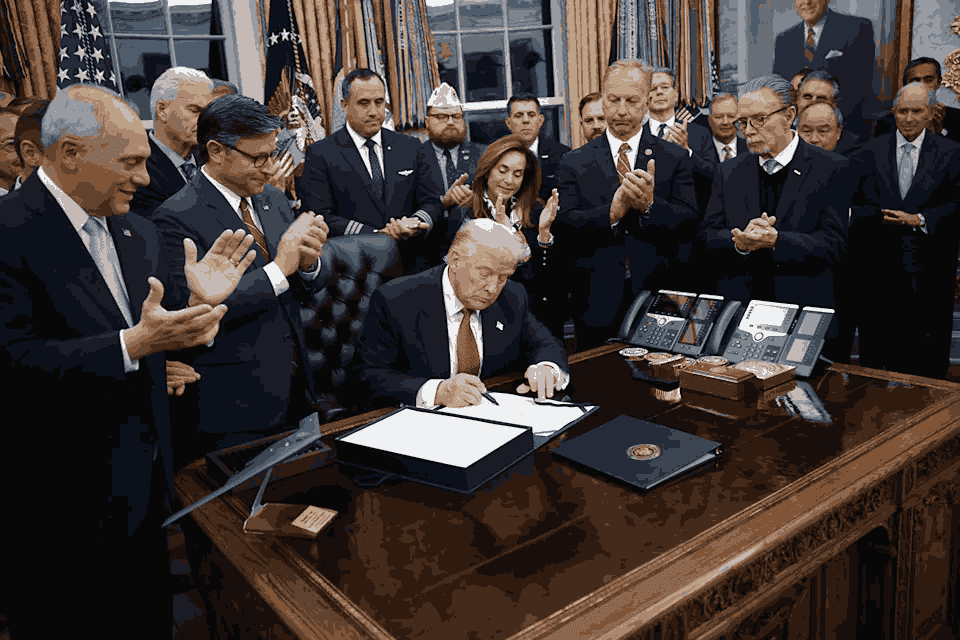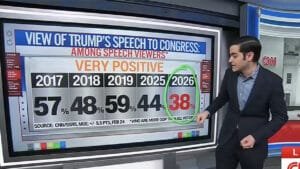Trump Pitches health Plan That Skips Insurers, Sends Money Straight To Consumers

Congress passes deal to end longest government shutdown in US history
President Donald Trump and Republican leaders are pitching a new alternative to the Affordable Care Act—one that bypasses insurance companies altogether. Their idea: send money straight to consumers so they can purchase coverage on their own.
The proposals differ and lack firm details, but Republicans are rallying behind the concept as Congress continues to stall on deciding the future of lower-cost health insurance for millions of Americans.
Democrats want to bolster the Affordable Care Act, often called “Obamacare,” by extending COVID-19 pandemic-era tax credits that expire at the end of 2025. Without these enhanced tax credits, average costs for 22 million Americans who get subsidized ACA insurance will more than double on Jan. 1, 2026, according to KFF, a health policy nonprofit.
Senate Majority Leader John Thune, R-South Dakota, promised a vote on the enhanced tax credits by mid-December but would not guarantee Republicans’ support to extend these subsidies. House Speaker Mike Johnson, R-Louisiana, hasn’t committed to a vote and called the enhanced tax credits a “boondoggle.”
When signing legislation to end the 43-day government shutdown without extending the subsidies, Trump said he wanted “money to go directly to you, the people.”
Senate Majority Leader John Thune, R-South Dakota, promised a vote on the enhanced tax credits by mid-December but would not guarantee Republicans’ support to extend these subsidies. House Speaker Mike Johnson, R-Louisiana, hasn’t committed to a vote and called the enhanced tax credits a “boondoggle.”
When signing legislation to end the 43-day government shutdown without extending the subsidies, Trump said he wanted “money to go directly to you, the people.”
While the tax credits would make Obamacare insurance more affordable for millions or enrollees, it would do little to slow rising health care costs most Americans face. Americans spend more on medical care than any other nation, and rising medical costs trigger higher insurance rates that all Americans pay, whether people get coverage from the workplace, Medicare or the Affordable Care Act.
More than 150 million Americans who get coverage through their employer will see average costs in 2026 rise at the highest level in a decade in a half. And older Americans on Medicare were notified their Part B premiums − the medical insurance that covers outpatient and preventive care, doctors’ visits and medical equipment − will jump 9.7% in 2026, straining affordability for seniors who rely on Social Security to make ends meet.
How would sending money directly to consumers work?
Trump hasn’t provided details on his proposal. In a Nov. 18 post on Truth Social, Trump said, “THE ONLY HEALTHCARE I WILL SUPPORT OR APPROVE IS SENDING THE MONEY DIRECTLY BACK TO THE PEOPLE,” instead of insurance companies.
Members of Congress, former Trump administration officials and some academic researchers have proposed using health savings accounts to fund health care.
Health savings accounts are commonly used by working-age Americans who get health insurance through an employer. These accounts, paired with high-deductible health insurance plans, allow consumers to sock away part of their paycheck before taxes. The money can be spent on eligible expenses such as a doctor or hospital bill or prescription drugs.
Sen. Bill Cassidy, R-Louisiana, wants health savings accounts to be paired with “bronze” level Affordable Care Act plans. Families would get federal money deposited into a health savings account to shop for health care. “It empowers the patient to lower the cost,” Cassidy said during a Senate hearing on Nov. 19.
Brian Blase, a White House adviser during the first Trump administration, has proposed shifting a portion of Obamacare funding to health savings accounts for low-income enrollees.
The Affordable Care Act now gives lower-income enrollees “cost-sharing reduction” payments to offset costs such as deductible and copays. Under Blase’s proposal, lower-income consumers would have to option of directing these subsidies to a health savings account, instead of sending payments directly to insurance companies.
Similar to Blase’s proposal, Sen. Rick Scott, R-Florida, on Nov. 20 announced a bill that would convert the ACA’s cost-sharing reduction payments to HSA-style “Trump Health Freedom Accounts.” States would need to submit a waiver to the federal government to establish “freedom accounts.”
Scott’s proposal would allow consumers to use the accounts to pay for health insurance premiums. With limited exceptions, HSA accounts now can’t be used to pay for health insurance premiums.
“Americans will alwaysmake a better choice for their families than the government will,” Scott said in a statement. “We should give them that opportunity and take a huge step forward in fixing Obamacare.”
Democrats warn of health insurance ‘cliff’ for millions of Americans
Democrats are skeptical about the timing of these Republican proposals. They say there isn’t enough time to reform Affordable Care Act tax credits without risking insurance coverage for millions of Americans.
“Individuals are going to lose health care. This is a cliff,” said Sen. Catherine Cortez Masto.
The Nevada Democrat said Congress should extend the enhanced premium tax credits for one year to give both parties time to study longer-term reforms. “It should be a thoughtful process and not putting people over a cliff,” Cortez Masto said.
Sen. Ron Wyden, D-Oregon, agreed there’s not enough time to craft health reform legislation before January insurance rates reset for millions of ACA enrollees. Congress should extend the enhanced premium tax credits first, he said.
“There is no way for Congress to put together a proposal in the next couple of weeks that’s going to help people in January,” Wyden said during a Senate committee hearing on Nov. 19.
Health policy experts also are skeptical of proposals that would divert existing Obamacare subsidies to health savings accounts. Such a move could risk upending the ACA marketplaces and compel healthier people to drop coverage, leaving insurance pools with sicker people and pricier monthly insurance premiums.
“The original tax credits that have existed since the ACA was first passed, that’s what keeps that market working,” said Cynthia Cox, KFF’s vice president and director of the Program on the ACA. “Without those tax credits, the market collapses, and then there’s no option for people who have preexisting conditions to get health insurance.”
The concept of sending money directly to consumers instead of health insurers is “an old, old idea,” said Robert Kaestner, an economist and research professor at the University of Chicago, Harris School of Public Policy. “This has been the conservative health reform plan for 40 years.”
Kaestner said health savings accounts might work for middle- and higher-income people who can afford to fund the accounts while paying for everyday living expenses. But he said lower-income families don’t have the same financial cushion, especially when they face a costly health expense such as cancer treatment.
“The HSA can’t cover your cancer care,” Kaestner said.





